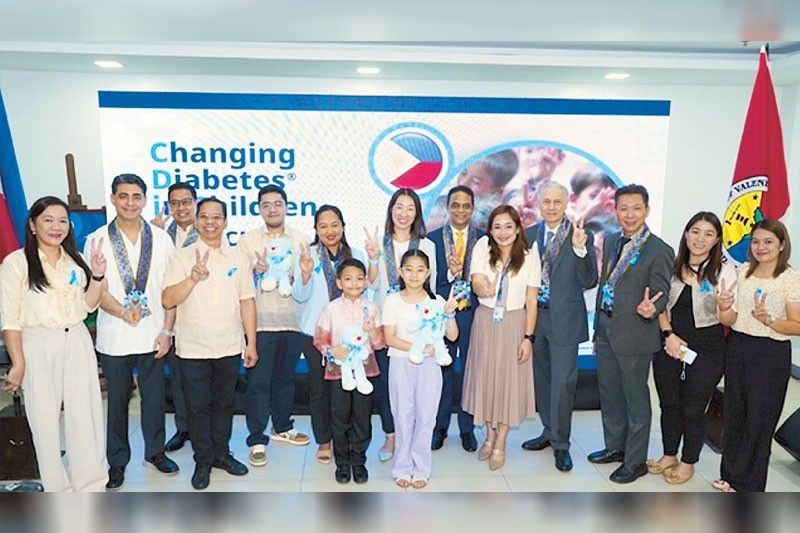Know the symptoms of type 1 diabetes to help your child lead a normal life


As parents, we know that toddlers and small children sleep, play and drink a lot. But if your child is suddenly drowsier than usual, is frequently thirsty, gets tired easily and loses weight drastically, it could be a symptom of type 1 diabetes.
Type 1 diabetes is an autoimmune condition in which a child is born without the ability to produce their own insulin. Your child could get it as an infant, or later, as a toddler or a teen. And if left untreated, this condition could lead to childhood stroke, heart attack, and visual impairments.
Changing diabetes in children
Over 400 million worldwide are diagnosed with diabetes. And this silent epidemic is on the march. In the Philippines, there are more than eight million people with diabetes and about 68,000 are children in dire need of support.
To survive, children with type 1 diabetes require daily insulin injections and close glucose monitoring. And each day, a child living with diabetes has to inject insulin four to six times, and prick fingers to monitor and manage their sugar levels. This can greatly limit a child’s ability to engage in his/her favorite activities like play.
Also, for many families in the Philippines, the high cost of insulin and lack of access to comprehensive diabetes care make managing this condition an uphill battle.
In an effort to fight type 1 diabetes and provide hope to diabetic kids and their families, Novo Nordisk Philippines, together with Humanity & Inclusion, and Roche Diabetes Care, supported by the Royal Danish Embassy in Manila, forged their commitment to providing quality of care during the recent inauguration of the Changing Diabetes in Children (CDiC) project in Valenzuela City.
Established in 2009, the CDiC project is a public-private partnership that aims to provide comprehensive care for children and young people living with type 1 diabetes in low- and middle-income countries like the Philippines.
Through this program, the government and private partners are changing the diabetes landscape in the country and giving hope to thousands of Filipino families. The goal is to reach 3,000 patients and provide them with free insulin, blood glucose monitoring equipment, and medical supplies.
Valenzuela City was chosen to pilot the CDiC program due to its impressive track record of successfully implementing healthcare policies for those who needed it the most.
“The City of Valenzuela is progressive. We continue to adapt and innovate. More importantly, we continue to collaborate,” said Dr. Martony Basco, head of the City Health Office of Valenzeula. “The city and the City Health Office are with you in the fight against diabetes in children,” said Dr. Martony Basco, head of the City Health Office of Valenzuela, during the launch.
Danish envoy to the Philippines Franz-Michael Melbin also expressed his support for the CDiC: “People with diabetes can lead normal lives. This program will help ensure that every child with type 1 diabetes gets the support they need, allowing them to live life to the fullest.”
Over the next five years, the CDiC project aims to reach 3,000 children with type 1 diabetes across the Philippines, with plans to expand to Iloilo and Davao late this year.

Access to inclusive information and health services
“Diabetes requires constant attention and takes no breaks,” said Russel Ibit, country head of Roche. “At Roche, patients are at the heart of everything we do. As a central part of care, people should have appropriate access to blood glucose monitoring.”
Aside from free medicines, the program offers comprehensive patient education so that patients and their families are empowered to have more control over disease management.
By establishing a network of facilities equipped to diagnose and treat type 1 diabetes, thousands of Filipino children will have better access to regular checkups and timely care.
“Through the CDiC, we will ensure that children with type 1 diabetes can access inclusive information and health services,” said Melanie Ruiz, country manager of Humanity and Inclusion. “Our goal is to make diabetes more accessible so every child has a fair opportunity to reach his/her full potential.”
During the inauguration of CDiC, children with type 1 diabetes shared letters of hope and gratitude with CDiC project partners. In turn, the partners presented the children with symbolic ribbons, representing their unwavering commitment and support, highlighting the project’s profound impact on the lives of these children.
Improving diabetes care worldwide
The CDiC project builds on Novo Nordisk’s long-standing commitment to improving diabetes care worldwide. To date, the program has successfully impacted over 52,000 children and adolescents in 28 countries.
“Insulin should be a birthright of patients with type 1 diabetes because it isn’t their fault. Society should respond by giving them equal opportunities,” said Anand Shetty, corporate vice president of Novo Nordisk. “As a company, we are committed to reaching 100,000 children and adolescents with type 1 diabetes by 2030.”
“No children and young adults should die from type 1 diabetes. We will stay united and committed to establishing a healthier, brighter and promising future,” said Wei Sun, VP and general manager of Novo Nordisk.
The CDiC program will serve as the foundation for future projects that will help build a future where every child with type 1 diabetes has a chance to live a normal life and face a brighter tomorrow where no child will die from diabetes.
What to watch for (in your child):
• Extreme drowsiness or lack of energy
• Intense thirst
• Grunting while breathing
• Heavy breathing
• Huge appetite
• Sudden vision changes
• Sudden weight loss
• Peeing more often
* * *
If you live in Valenzuela City and have a child with type 1 diabetes, you may be eligible to receive free insulin, blood glucose monitoring equipment, and medical supplies through the CDiC project. Contact your local health office to learn more.



















